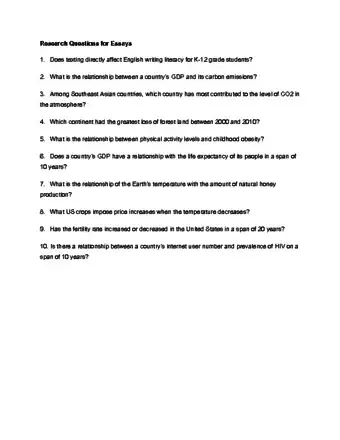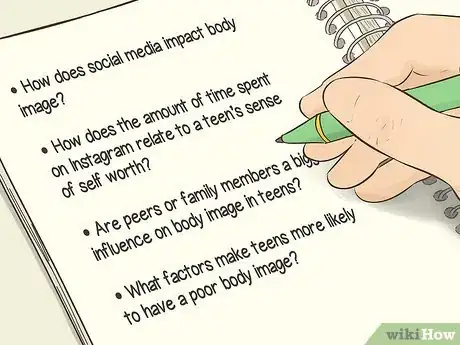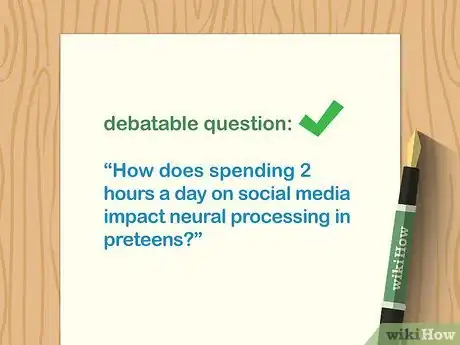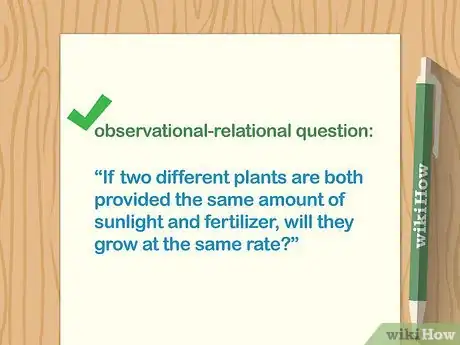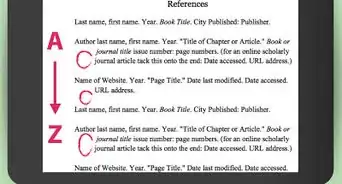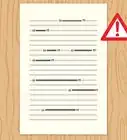This article was co-authored by Christopher Taylor, PhD and by wikiHow staff writer, Danielle Blinka, MA, MPA. Christopher Taylor is an Adjunct Assistant Professor of English at Austin Community College in Texas. He received his PhD in English Literature and Medieval Studies from the University of Texas at Austin in 2014.
This article has been viewed 72,136 times.
A research question helps you narrow your research and write a clear, arguable thesis. Your research question needs to be concise, arguable, and focused on your particular topic. Before writing your research question, narrow down your topic and brainstorm possible questions. Then, select the best question and craft it into a good research question. As another option, choose the type of research question that fits your purpose and format your question to fit that style.
Steps
Research Questions
Narrowing Your Topic
-
1Review your assignment to make sure you understand the expectations. Read over your assignment sheet several times, and study the rubric so you know how your work will be graded. If you have any questions, talk to your instructor for guidance and to clarify the guidelines.
- When you decide on a research question for your work, it's best to run it by your instructor.
-
2Pick a broad topic that provides opportunities for research. Stick to a broad, generalized topic, as you'll narrow it down later. Try to choose something you're passionate about, which will make working on your research project more interesting.[1]
- For instance, great topics for a high school paper might include family dynamics during the civil war, body image among teens, or type 2 diabetes.
- If you're doing a college-level project, a good topic might be the environment's influence on human development, cultural influences on a poet's work, or the ethics of technological advancements.
- In some cases, your topic may be provided to you, such as when you're writing a paper for a class. You can still use the same process for narrowing your topic and selecting a research question.
Advertisement -
3Conduct preliminary research on your topic to learn more about it. Start with a basic internet search to find general information about the subject. Then, expand to library databases, journal articles, and books. Read as much information as you can in the time you have available. This will help you understand the potential avenues of research, which you'll address with your research question.[2]
- The purpose of this research is to learn more, not gather sources. That means it's okay to check sites like Wikipedia, which aren't typically considered reliable sources.
-
4Write a list of open-ended questions about your topic. Do a brainstorming session to generate questions you may have based on your research. Start by listing things you wanted to know more about as you read. Then, consider what your audience might want to learn about your topic. Try to come up with at least 5-10 potential questions.[3]
- What, why, and how questions make the best research questions.
- Write down the first questions that come to mind without worrying if they'll make a good research question. You can always revise your question later to make it better.
- For example, let's say you chose body image among teens as your topic. You might write questions like, “How does social media impact body image?” “How does the amount of time spent on Instagram relate to a teen's sense of self-worth?” “Are peers or family members a bigger influence on body image in teens?” and “What factors make teens more likely to have a poor body image?”
- Similarly, you might write a college paper about the ethics of technological advancements. Questions you might ask include, "How is social media altering the culture of society?" "How does screen time alter the brain's neural processing?" and "How might current advancements affect society over the next 25 years?"
Tip: If you find yourself drawn to a particular question, don't keep brainstorming potential questions. Instead, start evaluating the question that interests you to figure out if it might be right for your research project.
Crafting an Effective Research Question
-
1Select a question that both interests you and can be researched. Look over the questions you've come up with during your brainstorming session, and pick an open-ended question you think will be the best one for you to research. This question should require you to do research and analysis to arrive at an answer. However, don't pick something that is too obscure for you to tackle well in the time you have available.[4]
- As an example, the question "What jobs will humans lose to robots over the next 50 years?" may be too difficult to answer. Instead, you might ask, "How has the field of robotics changed the manufacturing industry?"
Tip: When choosing your question, consider your skill level and purpose. If you're doing this project for a class, how will it be graded? What are your instructor's expectations? Additionally, make sure your question fits the scope of the assignment.
-
2Evaluate your question to make sure it will be a good research question. Some questions are interesting but don't make good research topics. This is usually because they are too easy to answer or aren't specific enough to allow you to write a focused paper. Fortunately, you can spot these issues before they derail your research project. Here are some questions to ask yourself when you're evaluating your question:[5]
- Is this question clear enough to guide my research?
- Is this question specific?
- Does this question allow for research and analysis?
- Can I answer this question based on current research? If so, could I easily find the answer by looking at basic reference works (which means the question is too easy to answer), or will it require more in-depth analysis using multiple sources?
- Has this question already been answered?
- Can I answer the question in an objective manner, based on evidence?
- Can I answer this question in the time I have allotted for this project?
-
3Narrow your question down until it's specific. Focus your question on a specific set of circumstances rather than being general. This usually means naming the individual items or conditions that you'll be discussing in your paper. Here are some examples of how to narrow a topic:
- “What factors cause teens to have poor body image?” is better stated “What environmental and social factors contribute to poor body image in teens?”
- “How does T.S. Elliot use symbolism?” becomes “Why does T.S. Elliot use tea as a symbol in 'The Lovesong of J. Alfred Prufrock?'”
- “What happened to family dynamics during the civil war?” can be narrowed to “How did the fracturing of families during the civil war affect society?”
- "How does screen time alter the brain's neural processing?" might be narrowed to "How does spending 2 hours a day on social media impact neural processing in preteens?"
-
4Make sure your question can't be easily answered. If you can answer your question with a quick search on the internet, then it's not a good research question. You want a topic that you can thoroughly examine in your paper while still leaving room for additional thought. It helps to choose a topic that's arguable, as these topics rarely have a right or wrong answer.[6]
- For instance, questions like, "What season of the year do parrots typically breed?" or "What era did William Wordsworth write?" are not great research questions because they are too easy to answer.
- The research question “Are peers or family members a bigger influence on body image in teens?” is arguable because you could make a case for either peers or family members having a greater influence on teenagers. Similarly, “Why does T.S. Elliot use tea as a symbol in 'The Lovesong of J. Alfred Prufrock?'” is arguable because different critics may have varying interpretations of the poem.
- As another example, "How does spending 2 hours a day on social media impact neural processing in preteens?" is debatable because you can focus on different effects. It's possible to interpret these effects differently, depending on your stance on the issue.
Tip: Research your question and see what comes up. If you feel like the search results effectively cover what you want to say, then you might want to pick a different question.
Choosing a Type of Research Question
-
1Form a descriptive question to examine conditions or characteristics. You can use a descriptive question to explore something that is happening. This might include defining the conditions surrounding an issue or looking at the issue in more detail. This type of question can be used in most subjects, including the humanities. Here are some examples of a descriptive question:
- "What environmental factors cause birds to move nests?"
- "What changes to the habitat can encourage parrots to mate?"
- "What political conditions contributed to the start of the War of 1812?"
- "What symbols does T.S. Elliot use in 'The Lovesong of J. Alfred Prufrock?'”
-
2Use an observational-relational question to look at how things affect each other. In most cases, you'll examine how 2 or more selected variables behave together under a specific set of circumstances. This type of question is used most often in the sciences or social sciences. Here's a list of examples:
- "If two different plants are both provided the same amount of sunlight and fertilizer, will they grow at the same rate?"
- "If two identical solutions are exposed to different quantities of an element, will they show equal or different reactions?"
- "If two test subjects are asked to perform a task alone and then together, how will collaboration affect their outcome?"
-
3Opt for a cause and effect question to look for a causal relationship. This type of question helps you determine if one factor is causing other conditions to occur. You're most likely to use this type of question in the sciences or social sciences. These are example cause and effect questions:
- "Will the introduction of a new plant to a biodome affect the ecosystem?"
- "Does changing team assignments cause workers to lose morale?"
- "Do metered ramps on highways change driver behavior?"
Community Q&A
-
QuestionIs it ideal to design research questions in the past tense ?
 Community AnswerYes it's fine. As a rule, use past tense to describe events that have happened in the past, but not generally accepted facts.
Community AnswerYes it's fine. As a rule, use past tense to describe events that have happened in the past, but not generally accepted facts.
References
- ↑ https://libraries.indiana.edu/sites/default/files/Develop_a_Research_Question.pdf
- ↑ https://libraries.indiana.edu/sites/default/files/Develop_a_Research_Question.pdf
- ↑ https://www.pewresearch.org/our-methods/u-s-surveys/writing-survey-questions/
- ↑ https://cirt.gcu.edu/research/develop/tutorials/question
- ↑ https://writingcenter.gmu.edu/guides/how-to-write-a-research-question
- ↑ https://writingcenter.gmu.edu/guides/how-to-write-a-research-question
About This Article
To write a research question, start by writing a list of open-ended questions that relate to the topic you're researching. For example, if your topic was social media, your questions might look something like "How does social media impact body image?" or "What impact does social media have on our culture?" Next, choose the question that interests you the most, and try to make it as specific as possible. Also, make sure it can't be easily answered since you want a topic that you can thoroughly examine. For more advice, like how to choose a topic to research, keep reading!
